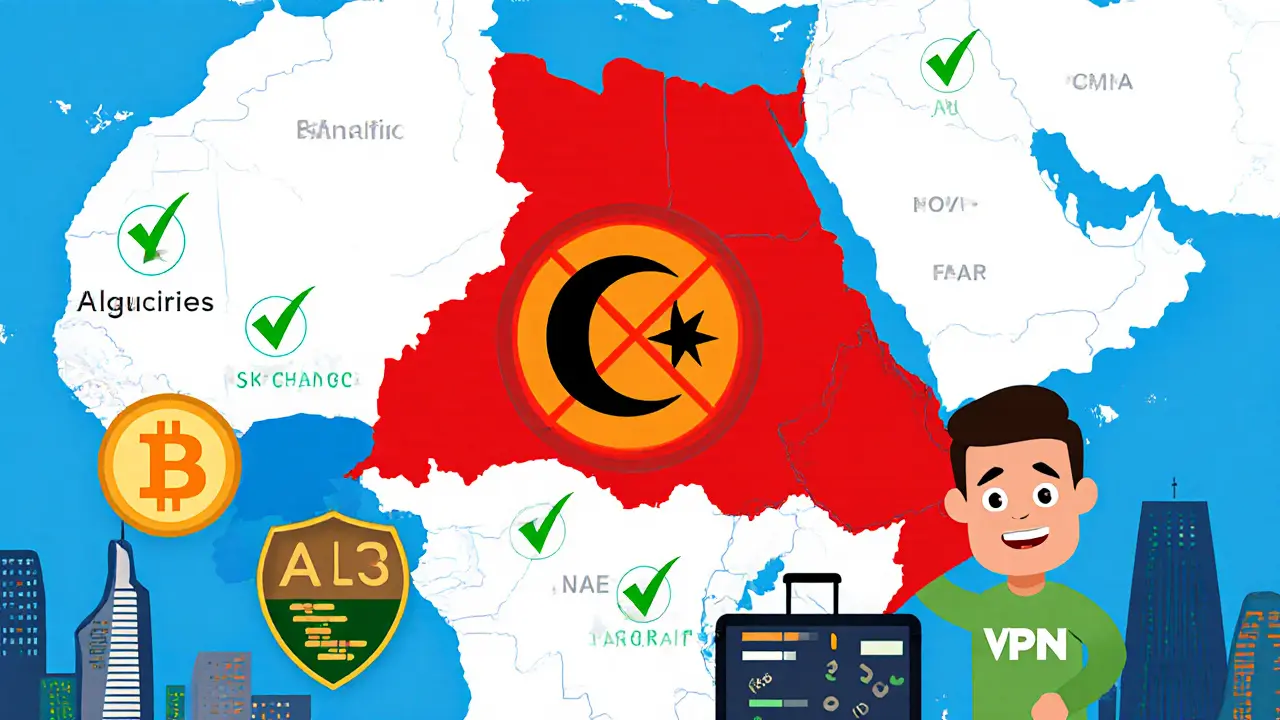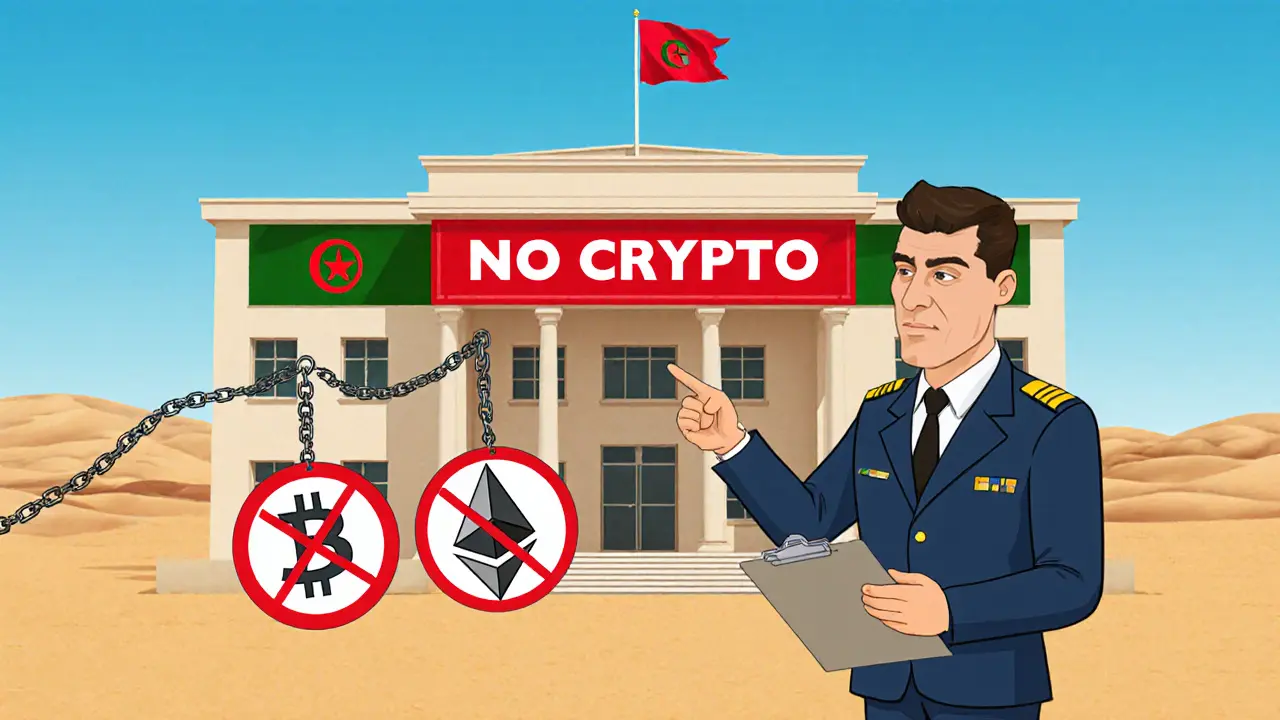Algeria Crypto Penalty Checker
Penalty Assessment Tool
Select your violation type to see potential penalties under Algeria's cryptocurrency ban (Law No. 25-10).
Penalty Range
Law No. 25-10Algeria has thrown a wrench into the crypto world with a sweeping ban that carries real jail time and hefty fines. If you’re wondering what could happen to an Algerian who buys, sells or even talks about Bitcoin, the answer lies in a set of rules that came into force in July 2023. Below is a plain‑English walk‑through of the law, the punishments it imposes, and what it means for anyone dabbling in digital assets from within the country’s borders.
What the law actually says
Law No. 25-10 is the 2023 Algerian amendment that criminalises every step of cryptocurrency activity, from buying to mining and even promotion. The text defines a cryptocurrency as a “virtual instrument used as means of exchange via a computer system, without support from a central bank.” In practice, this covers Bitcoin, Ethereum, stablecoins and any future digital token.
Alongside the law’s definition, the decree states that purchase, sale, use, holding, mining, promotion, or even the mere possession of these assets is strictly forbidden. The ban is not limited to financial services - it reaches wallets, exchanges, blockchain nodes, payment gateways, and anyone publishing content that could be seen as encouraging crypto use.
How wide is the net?
The scope is deliberately broad. It targets:
- Individuals who buy or sell crypto on peer‑to‑peer platforms.
- Businesses that operate wallets, exchanges, or payment processors.
- Developers who host blockchain nodes or create smart‑contract tools accessible in Algeria.
- Influencers, educators, and content creators who discuss or promote digital assets.
Even a casual social‑media post mentioning the price of Bitcoin could land you in trouble if authorities deem it promotional.
Penalty breakdown - prison time and fines
The law lays out a tiered penalty system. For a first‑time offence, courts can impose anywhere from two months to one year of imprisonment. Fines range from 200,000 to 1,000,000 Algerian dinars (roughly $1,540 to $7,700 USD). In more severe cases-such as repeat offences, large‑scale operations, or links to money‑laundering-fines can jump to 2million dinars ($14,700) and prison terms may be doubled.
| Violation Type | Imprisonment | Fine (Algerian Dinars) |
|---|---|---|
| Simple possession or purchase | 2 months - 1 year | 200,000 - 1,000,000 |
| Operating an exchange or wallet service | 6 months - 1 year | 500,000 - 2,000,000 |
| Repeat offence or organized crime link | Up to 2 years (court discretion) | 1,000,000 - 2,000,000 (plus possible asset seizure) |
In practice, enforcement agencies often favor the financial penalty because the maximum prison term is relatively low. Still, the threat of a jail record is enough to make many stay away from crypto entirely.
Who enforces the ban?
Algeria created a specialized unit inside the National Agency for the Fight Against Money Laundering and the Financing of Terrorism (ANLCCFT). This body monitors digital transactions, uses blockchain‑analysis tools similar to those employed by the U.S. IRS, and can shut down servers or seize assets that facilitate crypto activity.
The law also grants the agency the power to request data from internet service providers and to block access to foreign crypto exchanges. The combination of legal authority and technical surveillance makes compliance a high‑stakes game for any Algerian who touches digital assets.

Regional context - how Algeria stacks up
Most of the MENA region is moving toward regulated adoption. The United Arab Emirates runs the Virtual Assets Regulatory Authority (VARA), Bahrain has a formal licensing framework, and Saudi Arabia is drafting its own rules through the Saudi Central Bank. In contrast, Algeria sits alongside China and Egypt as one of the few jurisdictions with an outright ban.
According to the World Economic Forum’s 2023 MENA Crypto Regulation Report, only eight of 138 countries enforce a total prohibition. This isolation risks capital flight and a brain drain of blockchain talent, a trend already visible in the exodus of developers to Morocco and Tunisia.
What this means for everyday Algerians
If you were part of the peer‑to‑peer market that Chainalysis identified as one of the fastest‑growing in the region, the new law essentially wipes that out. Traders report shutting down local groups, deleting social‑media channels, and moving any remaining activity offshore.
Even if you’re only curious about crypto prices, the safest route is to avoid any public mention or transaction that could be interpreted as promotion. Many Algerians are now turning to foreign VPNs and offshore wallets, but that carries its own legal risk if authorities trace the connection.
Compliance checklist for businesses
- Audit all digital‑payment channels for links to crypto wallets or exchanges.
- Remove any marketing material that references Bitcoin, Ethereum, or other digital assets.
- Conduct employee training on the definition of “promotion” under Law No. 25-10.
- Implement monitoring tools to flag inbound or outbound traffic to known blockchain nodes.
- Establish a legal response plan in case of a law‑enforcement inquiry.
Following this checklist can help avoid the steep fines that have already hit several local startups.

Next steps for individuals
For anyone still holding crypto, the immediate options are limited:
- Transfer assets to a trusted offshore wallet before the enforcement deadline.
- Consider liquidating holdings through a reputable exchange outside Algerian jurisdiction.
- Seek legal counsel familiar with Algerian financial‑crime law to assess exposure.
Remember, the law applies not just to the act of trading but also to the possession of crypto assets, so leaving them idle in a wallet still carries risk.
Key takeaways
- Law No. 25-10 bans all crypto activity in Algeria, including holding and promotion.
- Penalties range from two months to one year in prison and fines of 200,000‑2,000,000 Algerian dinars.
- Enforcement is led by ANLCCFT, which uses advanced blockchain‑analysis tools.
- Compared with neighboring countries, Algeria’s approach is among the most restrictive globally.
- Compliance requires immediate removal of any crypto‑related services, content, or transactions to avoid severe fines.
Frequently Asked Questions
Can I still hold Bitcoin in a personal wallet?
Technically, possession is prohibited. Holding crypto may be treated as a criminal offense, subject to fines and possible imprisonment.
What is the maximum fine for a repeat crypto offense?
Repeat offenders can face up to 2million Algerian dinars (about $14,700) in fines, and the court may double the imprisonment term.
Does the ban affect blockchain development tools?
Yes. The law’s language covers any tool that enables crypto activity, so hosting a node or releasing smart‑contract libraries from within Algeria can be prosecuted.
How does Algeria’s crypto ban compare to other MENA countries?
Unlike the UAE’s VARA or Bahrain’s licensing regime, Algeria imposes a total prohibition, putting it in the same category as China and Egypt-among the strictest globally.
What should a business do if it inadvertently processed a crypto transaction?
The company should immediately cease the activity, document the incident, and consult a legal specialist to mitigate potential fines.

Miguel Terán
July 30, 2025 AT 21:37Algeria’s decision to outlaw crypto feels like a bold proclamation that the state refuses to dance with the digital future, a stance that reverberates far beyond its borders. The law’s wording reads like a shield erected to protect citizens from the allure of speculative assets, yet it also serves as a warning to anyone daring to experiment with decentralized finance. By criminalising everything from buying a single Bitcoin to hosting a node, the government has drawn a line in the digital sand that many will now respect or evade. The penalties, though seemingly modest in prison time, carry heavy financial weight that can cripple small entrepreneurs overnight. Enforcement agencies equipped with blockchain‑analysis tools can trace even the faintest transaction, turning anonymity into a myth for Algerian users. This creates a chilling effect where investors think twice before moving funds into crypto wallets, fearing the stare of a watchdog. Moreover, the ban extends to promotional activities, making it risky for educators or influencers to discuss market trends in any forum. The ripple effect may push talent out of the country, as developers seek friendlier ecosystems in Morocco or Tunisia. While some argue that the law safeguards the economy from volatile assets, critics point out that it stifles innovation and blocks access to emerging financial tools. The comparison with neighboring MENA nations shows a stark divergence, where UAE and Bahrain are building regulatory frameworks instead of imposing outright bans. From a legal perspective, the tiered fines and imprisonment terms demonstrate a calibrated approach that the state believes balances deterrence with proportionality. Yet the reality on the ground suggests that many will resort to VPNs and offshore wallets, a shadow market that is harder to police. The government’s capacity to request ISP data and block foreign exchanges adds another layer of control that blurs the line between regulation and censorship. In short, the law is a double‑edged sword that aims to protect but may inadvertently drive crypto activity further underground. Ultimately, the success or failure of this policy will hinge on how effectively authorities can monitor a decentralized network that was designed to evade central oversight.
Shivani Chauhan
August 4, 2025 AT 11:33It’s crucial to highlight that the specific fines are denominated in Algerian dinars, which can fluctuate against the dollar, amplifying the economic impact on offenders. The law explicitly mentions “promotion” as an offense, so even casual social‑media commentary can be interpreted as a violation. Companies operating in Algeria should immediately audit their payment gateways to ensure no crypto‑related transactions slip through. Training staff on the legal definition of cryptocurrency under Law No. 25‑10 will reduce inadvertent breaches. Overall, a proactive compliance checklist can save businesses from costly penalties.
Deborah de Beurs
August 7, 2025 AT 22:53The government’s heavy‑handed crackdown is nothing short of a draconian overreach that smacks of fear‑mongering, and it’s absurd to think this will deter tech‑savvy youths. By criminalising even the act of talking about Bitcoin, they’re effectively muzzling free speech under the guise of financial safety. Enforcement agencies will chase shadows while the real innovation flees the country, leaving a vacuum for opportunists. It’s a classic case of trying to hold water in a sieve.
Sara Stewart
August 12, 2025 AT 14:00The regulatory landscape outlined in the article underscores a comprehensive risk‑assessment matrix that aligns AML controls with sanctions compliance, effectively raising the bar for any crypto‑related service provider operating within Algerian jurisdiction.
Laura Hoch
August 16, 2025 AT 01:20When a state attempts to outlaw the very infrastructure of decentralized consensus, it raises profound questions about the balance between sovereign authority and individual autonomy; the blockchain’s immutable ledger becomes a silent witness to policy overreach, reminding us that technology often outpaces legislation, and that the true cost of prohibition may be measured not in dinars but in stifled human potential.
Devi Jaga
August 19, 2025 AT 12:40Oh great, because nothing says “progress” like writing lengthy essays about how the government “outpaces” technology while simultaneously banning the very tools that could propel its own development. 🙄
Hailey M.
August 21, 2025 AT 20:13Wow, look at us dissecting legalese while the average Algerian just wants to send a meme to a friend-this whole “risk‑assessment matrix” feels like an over‑caffeinated lawyer’s daydream. 😂
Jason Zila
August 24, 2025 AT 03:46The ban’s narrow focus on crypto ignores the broader ecosystem of fintech innovations that could benefit the Algerian economy, making the policy appear myopic and counterproductive.
Cecilia Cecilia
August 26, 2025 AT 11:20Indeed, a more nuanced approach that differentiates between speculative trading and legitimate blockchain applications would likely yield better regulatory outcomes.
lida norman
August 28, 2025 AT 18:53Crypto bans just push the tech underground.
Schuyler Whetstone
August 31, 2025 AT 02:26Honestly it’s a sin to lock people out of financial freedom, especially when the government pretends to protect us while stiflin’ innovation and leavin’ the youth with no options.
David Moss
September 2, 2025 AT 10:00What most people don’t see is that these draconian crypto laws are a smokescreen for a larger agenda: consolidating state surveillance over every digital transaction, turning the blockchain into yet another tool for the deep‑state’s data‑harvesting ambitions.
Pierce O'Donnell
September 4, 2025 AT 17:33Sure, because every government that regulates finance is secretly plotting world domination; maybe they just don’t want people messing with money they can’t control.
Vinoth Raja
September 7, 2025 AT 01:06At the end of the day, the clash between decentralized networks and centralized authority is just the latest chapter in the age‑old story of power trying to tame the wild, and the tech community will keep finding creative ways to stay one step ahead.